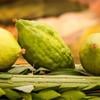Nachum Luria’s straw hat has seen better days as he travels, in his open jeep, in the heat to his etrog orchards on the outskirts of Kfar Chabad, Israel. His face shines as we come closer to the orchards, covered in black netting to protect the workers and fruit from the sun. But Luria says that we still have lots of other predators, in the form of bugs “that come to attack the delicate fruit.” Among his many tasks is finding a pesticide that will protect the precious commodity from nature’s pests and yet not damage the fruit.
Jewish law mandates that the etrog, a labor-intensive citrus that looks kind of like a lemon and is part of the “four species” used in the celebration of Sukkot, not result from any combination of other fruits. In addition, those fit to be used for the holiday grow only from spring until the end of summer.
This particular year poses an added challenge to Luria. The biblically mandated prohibition of Shemittah—or letting the lands of Israel lie fallow every seven years—meant that the orchard’s workers had to harvest well before the Jewish New Year of Rosh Hashanah.
“This year we harvested the fruits as early as possible,” says Luria, whose father-in-law first planted the etrog trees in the early years of Kfar Chabad, a town founded by the sixth Lubavitcher rebbe, Rabbi Yosef Yitchak Schneersohn, of righteous memory, in 1948.
The etrog tree itself is very weak and difficult to protect. Metal bars support the plant so that the citrus doesn’t fall and get damaged. But workers must also guard the fruit from the tree, which has thorns that can cause blemishes in an etrog and render it less desirable.
“The etrog fruit needs to be under constant surveillance 24 hours a day,” says Luria, whose fruits, and others coming from the various orchards owned by Kfar Chabad growers, are sold across the globe. “The fruit is not like an orange, that you can walk away from until the fruit-picking season.
“If the fruit grows touching a leaf, it will grow as the shape of the leaf,” he adds. For that reason, every fruit is given personal attention; some even get a special cushion.
From Italy to Kfar Chabad

“This orchard is grown from an etrog that came from Italy,” says Luria.
The packing of the gentle fruit requires expertise, as well. The workers at Etrogei Lubavitch, the Kfar Chabad cooperative that markets and distributes the fruit, pack each etrog into cushioned cartons.
The town fills up several weeks before Sukkot, as Jews from all walks of life descend on the central Israeli village to buy etrogs. On Monday, Israeli chief rabbi Yonah Metzger visited Kfar Chabad to find a fruit for his own personal use.
For the following year, though, Shemittah regulations will officially shutter Luria’s orchard and all others like it throughout Israel, including all fields. The practice is derived from a passage in Leviticus: “For six years you shall sow your field, and for six years you shall prune your vineyard and gather in its produce. But in the seventh year, the land shall have a complete rest, a Sabbath to the L‑rd; you shall not sow your field, you shall not prune your vineyard, nor shall you reap the aftergrowth of your harvest.”
An ancient legal innovation, though, ensures that the fruit is not left to rot. For the duration of the Shemittah year, the field will be under the domain of a rabbinical court, which will assume the responsibilities of distributing the produce to consumers. Luria and his workers, forbidden from profiting off of any agriculture during that time, will receive a flat fee from the court for their labor only.
The decision is based upon the fact that during the Shemittah year everyone may pick any fruit that they see. Only harvesting for profit, and other activities designed to benefit the plant itself, are prohibited. Individuals are allowed to pay others for their labor in picking their personal fruit. The rabbinical court, in effect, acts as a collection of individuals in paying farmers for the labor involved in bringing produce to the court.
“My workers are paid for their time and work; however, we do not sell our own fruit,” says Luria.
With years of experience behind him, Luria always looks on the bright side.
“More than 60 percent of the fruits are not good to use. Look at this fruit,” he says as he holds up a rather filthy etrog that has its share of blemishes. With a smile, he states: “This one protects the other fruit, so that the others should be clean and unblemished.”








Curious to know if an etrog grown during the shmita but picked after it is kosher for that next year's sukkot? For example, if it was grown during 5782, but picked in 5783. If kosher, is it's demand higher? And what would the price be from low to high? An average?
An etrog that grew during shmitah (especially if it was mostly grown before the end of the year) but picked after, has the same status as an etrog grown and picked during shmitah. Generally, a shimtah etrog is kosher for use, but it cannot be discarded in the same way one would discard an etrog of a typical year. As far as I know, there is no specific demand for a shmitah etrog.